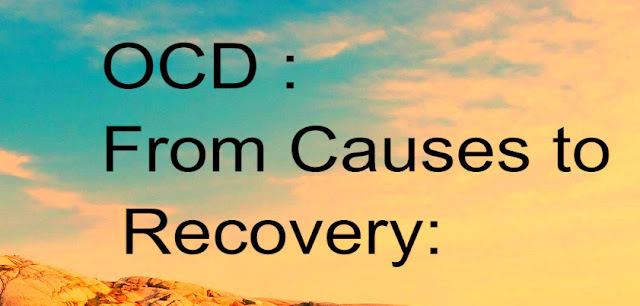OCD : From Causes to Recovery:
 |
OCD : From Causes to Recovery:
When it comes to answering the question of what causes OCD, the simple answer is that OCD is caused by a mix of genetic and environmental factors, which are then compounded by the decisions we make every single day. It really is a complex mixture and the interplay between nature and nurture both in the past and then in the decisions you're making right now.
Even researchers have tried to find a
specific gene they could target as responsible for OCD but those studies have
turned up inconclusive results. Sometimes the studies into the genetic sources
of mental health challenges only prove that learned factors play just as big a
role. For instance one study on the serotonin transporter gene variant of five
HTTP that's often implicated in having low levels of serotonin. Researchers like
to look at it as a source of mental health challenges.
One study found that it's not as simple
as that, in fact having that particular variant of the serotonin transporter
gene was linked to having a higher incidence of mental illness. But was also
linked with having a higher incidence of being exceptionally mentally healthy.
What they found the difference between those two groups were, what they learned
from their parents .So, there you have a genetic factor that makes people susceptible
to mental illness but also makes them susceptible to being mentally healthy. The
difference there is the healthy or unhealthy habits they learn from their
parents, so there you can see this complex interplay between nature and nurture.
Sometimes
it's in our nature to be nurtured, whether that nurturing is healthy or
unhealthy is really the question there, but at the same time lots of people,
who don't have that particular variance of the serotonin transporter gene still
develop OCD. So, again we're back to, it's really complex now as complex as it
is. There is one particular myth I'd like to get taken care of and pushed out
of the way and that is the chemical imbalance myth. So, OCD is not caused by a
chemical balance in your brain. The chemical imbalance myth is incredibly
persistent and pervasive but it's simply not true. It's just hung around
because again it's a simple answer to a complex problem. We love simple answers,
we love to be sure, it's very easy to say.
What
it's a chemical imbalance up there, meaning
I've got eight of one and eleven of the other and that's causing me to. So, I
only bring up that myth, so we can get it out of the way, you don't have a
chemical imbalance. A chemical imbalance is not the cause of your OCD researchers
have been pretty upfront for a long time that they didn't know, why SSRIs
worked. They knew you could have really high levels of serotonin and be depressed
then, you can have really low levels of serotonin and not be depressed and not
have a OCD and not have other problems. So, they weren't exactly sure why
because they did know that hey when you give people. SSRIs things happen recent
research has found that the reason SSRIs are an effective part of treatment for
OCD, when combined with behavioral therapy is because SSRIs boost neural
plasticity in the brain. So, that's improving the brains ability to rewire
itself. This is of course what you're doing when you're doing behavioral
therapy and you're unlearning the unhealthy behaviors that are exacerbating
your OCD and you're learning new healthy behaviors as a response to anxiety and
other things going on in your head.
One of the reasons why the chemical
imbalance myth is so persistent and so popular is because it gives us the
opportunity to blame something we have no control over. It's these chemicals in
my brain I have an imbalance, it's not my fault and there's nothing, I can do
about it. That's very attractive and that's the last thing I want to talk about
which is this need to blame and be certain and assign responsibility for
illness. It's really not important and it's really unhelpful, when it comes to recovery
it does not matter how, you got to, where you are all that matters is how
you're going to get out of here. When we have an anxiety disorder, we really
want to be certain about things in many ways.
An anxiety disorder is about having an
unhealthy relationship with certainty and constantly trying to avoid
uncertainty in the world,. constantly trying to avoid experiencing negative
emotions. So, of course when we're confronted with uncertainty like how did I
get OCD, we automatically compulsively want to answer that question and we want
to be certain and we want to desperately make sure that it is not our
responsibility for this negative thing that's happened. That's really unhelpful
at the same time, it's totally part of the illness.
Who's responsible for OCD it doesn't matter, who we're going to blame, not important. What's important is not who's responsible for OCD what's important is, who's going to be responsible for recovery and the answer to that is you. It really doesn't matter how you got to, where you are focusing on the past is not going to help you move into the future all that matters is being responsible for your recovery.

Post a Comment
Please do not enter any spam link in the comment box.
Regards